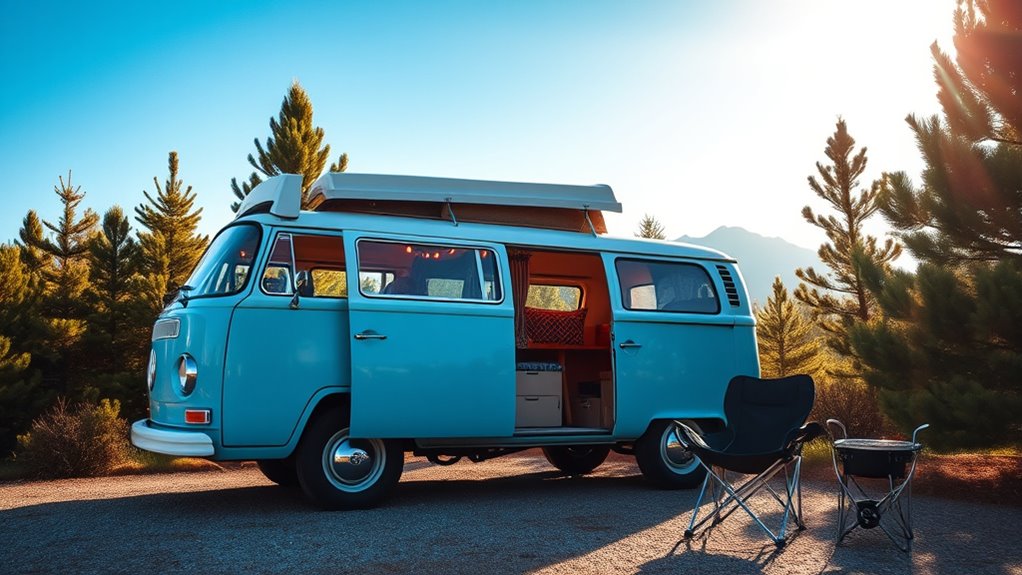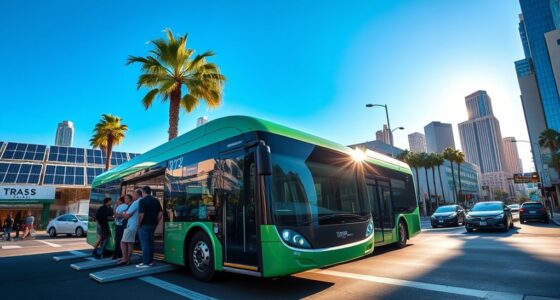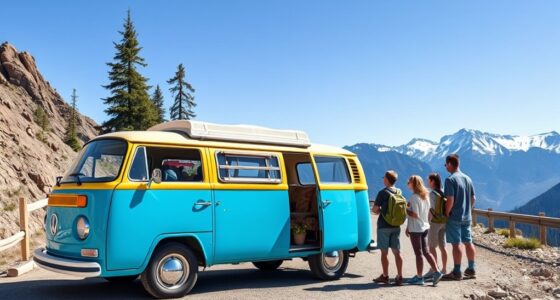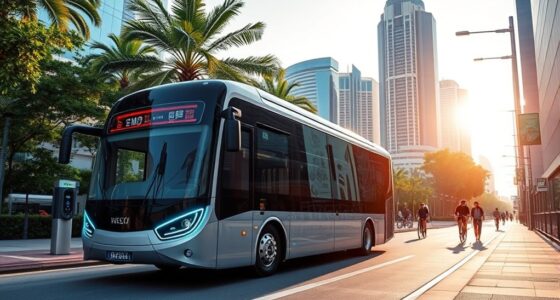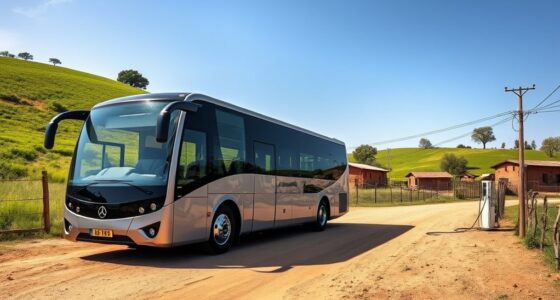Living full-time in a VW bus offers a freeing, minimalist lifestyle filled with adventure and resourcefulness. You’ll transform your van into a cozy home with carefully planned conversions for essentials like a bed, small kitchen, and storage. Budgeting is key to manage expenses like fuel, campground fees, and supplies. Flexibility helps you adapt to unexpected costs, making your journey sustainable. Want to discover tips for affordable living and making the most of your camper van experience? Keep exploring!
Key Takeaways
- Full-time VW bus living requires careful planning for essentials like sleep, cooking, and storage to maximize limited space.
- Budgeting for conversion, travel, and daily expenses is crucial to sustain long-term van life.
- DIY conversions can reduce costs, but professional help offers a more polished and comfortable setup.
- Flexibility with plans and expenses helps manage unexpected costs and enhances the van life experience.
- Living in a VW bus fosters independence, resourcefulness, and a sense of adventure, emphasizing simplicity and exploration.
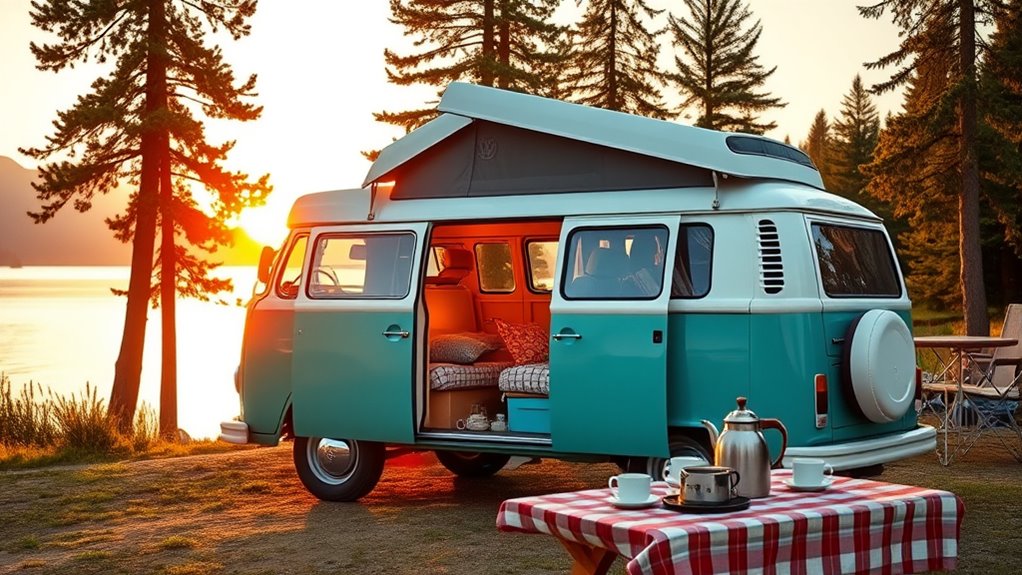
Living the camper van life offers a unique blend of freedom and adventure, allowing you to explore new places on your terms. One of the first steps to embracing this lifestyle is understanding van conversions. Turning a regular Volkswagen bus into a cozy, functional home on wheels requires careful planning and some DIY skills. You’ll need to decide what essentials you want—like a bed, a small kitchen, and storage—and then find ways to maximize your limited space. Customizing your van helps create a comfortable environment, but it also involves budgeting wisely. Van conversions can vary widely in cost, so setting a clear budget from the start is essential. You might choose to do most of the work yourself to save money or hire professionals for a polished look. Either way, understanding your expenses beforehand helps you stay on track and avoid overspending.
Once your van is ready, managing travel budgeting becomes a key part of your journey. Unlike traditional vacations, living in a van means you’ll constantly be adjusting your spending based on where you are. Fuel costs can fluctuate, and campground fees add up, so planning your route with budget-conscious stops can make a big difference. You’ll also want to keep tabs on daily expenses like food and supplies. Living frugally isn’t just about saving money; it’s about creating a sustainable lifestyle. Cooking your own meals instead of eating out frequently can greatly cut costs, especially when combined with shopping at local markets or bulk stores. Additionally, free or low-cost parking spots—like national forests or designated overnight parking—can help you extend your travel budget.
Living in a van also means being flexible with your plans. Sometimes, unexpected expenses pop up, whether it’s a repair or a last-minute change of scenery. Having a contingency fund makes these surprises less stressful. You’ll learn to balance your desire for adventure with the realities of limited resources. Keeping track of your expenses through apps or spreadsheets helps you stay accountable, ensuring you don’t overspend and can keep your journey sustainable for the long haul. As you gain experience, you’ll become more adept at finding affordable camping spots and managing your budget effectively. This lifestyle isn’t just about escaping the ordinary; it’s about embracing a new way of living that values simplicity, resourcefulness, and exploration. With thoughtful planning in your van conversions and travel budgeting, you’ll enjoy the freedom to roam without sacrificing comfort or financial stability.
Frequently Asked Questions
How Do I Find Safe Parking Spots Overnight?
Finding safe overnight parking is key to your camper van experience. You can look for designated public rest stops, which often allow overnight stays and are monitored for safety. Additionally, making campground reservations in advance guarantees a secure spot. Always research local regulations and avoid parking in secluded or unmarked areas. Combining these options helps you enjoy peace of mind and a safe night’s sleep wherever your journey takes you.
What Are the Best Ways to Stay Connected Off-Grid?
Staying connected off-grid is like keeping a lifeline in rough waters. You can harness solar power to charge batteries during the day, ensuring your devices stay powered up. For reliable internet, satellite internet is your best bet, providing connectivity even in remote spots. With these tools, you’ll maintain communication and access to essential info, making your adventures safer and more enjoyable without sacrificing connectivity.
How Do I Handle Waste Disposal Legally?
You need to handle waste disposal legally by understanding local regulations. Use designated gray water disposal sites for your gray water, and make sure you don’t dump it illegally. When using a chemical toilet, empty it at approved dump stations. Always follow rules and avoid dumping waste in unauthorized areas, protecting the environment and staying compliant with laws. Proper disposal keeps your adventure responsible and hassle-free.
What Insurance Options Are Available for Full-Time Van Living?
You should explore insurance options that specifically cover full-time van living, including vehicle coverage and liability policies. These policies protect you against accidents, theft, and damages, ensuring you’re financially secure. Look for providers experienced with full-time RV or van owners, and compare plans to find one that fits your lifestyle and budget. Having the right insurance means peace of mind while you’re on the road, living your adventure fully protected.
How Can I Maintain Mental Health on the Road?
Think of your mind as a garden that needs regular tending. To maintain mental health on the road, you should access mental health resources like therapy apps and support groups. Practice stress management techniques such as meditation or deep breathing. Staying connected with loved ones, maintaining routines, and taking time for self-care help keep your mental garden flourishing amidst the adventures. Prioritize your well-being for a happier, healthier journey.
Conclusion
Living full-time in a VW bus is like finally finding your home in a rolling sanctuary, where every sunrise paints a new masterpiece and every mile whispers adventure. It’s a wild, freeing dance between the road and your spirit, turning everyday moments into stories worth telling. So, embrace the open highway, let your soul wander, and remember — the road is your canvas, and your camper van is the brush. Happy travels!
